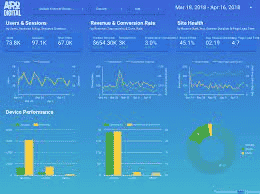How to track your SEO performance

What is SEO Performance?
SEO performance measures the success or failure of organic traffic to a website based on SEO professionals and SEO agencies. This allows teams to measure the success of their strategies and continue to track the progress of a website.
SEO campaigns can be measured in many ways. Your choice of measurement method comes down to the kind of campaign you ran and the strategies you used.
How to Start Tracking SEO Performance
Not sure where to begin measuring SEO? Would you like to track SEO KPIs but are stuck deciding which to track?
Here are five things you can (and should) start tracking right now, and they don’t have to be complicated.
Let’s begin:
1. Rankings of keywords
Having strong organic keyword rankings is crucial for driving traffic to your business’ website and generating revenue. A site that ranks high for its most important keywords will have a greater chance of reaching its maximum potential traffic.
Here, it’s important to specialise. To perform effective dental SEO, such as in this example, you need to conduct a keyword analysis of the industry you are ranking. You need to find the relevant terms, whether dentists, plumbers, or SAAS.
What makes it so important? If you pick the incorrect keywords and rank poorly, you will fail to get that traffic and leads, conversions, and revenue.
2. Quality and Quantity of Backlinks
An important ranking factor that search engines use in their algorithms is the number of backlinks to a website. In the meantime, black hat SEOs have abused it to game the system to generate a lot of links for your website, but there’s more to it than that.
You need to consider things now, such as having a steady backlink growth over time and having links from quality and relevant websites (aka link relevance). In conjunction with the number of backlinks you have, those factors provide the best indicators of your SEO performance.
You can find reports and features on your backlink profile in many SEO tools. All of those metrics and others can be seen using Moz’s Link Explorer, Ahrefs’ Site Explorer, and Monitor Backlinks.
3. Using organic search
You need to analyse your keyword rankings and backlink profile to find out how you can get more organic traffic. However, to generate more organic traffic, you need to improve your keyword rankings and gain more links.
Organic Search Traffic is generally the metric with the most excellent correlation to driving revenue through SEO. Increasing the organic traffic to your website is likely to increase your leads, conversions, and sales.
Google Analytics remains the best tool to monitor organic search performance. Others will cost you money, but they will show you organic sessions. But you can still use Google Analytics for free.
4. Analyze and track your lowest earning organic traffic sources
You likely have some old content and pages on your old website that you haven’t updated in a while. You need to review your website’s pages to determine which ones generate minor organic traffic.
Your old content can make a dramatic difference in the organic performance of your current content. There could be several reasons for this, including that the content information is outdated, and users no longer find it helpful. The problem could also occur due to technical problems you didn’t notice, such as broken links or images.
5. Measure your conversions
You should aim to increase conversions with any SEO campaign you run. Your website may receive a lead from someone seeking to schedule an appointment or purchase a product. This is an indication that your marketing campaign is driving direct revenue.
Ranking high for keywords and getting lots of organic traffic are great. However, you should revamp your website if it is not generating conversions.
You may need to add more or better links to send people to your conversion pages. You might not have a properly-structured conversion page, or there may be a technical issue preventing people from making a purchase or filling out a form.
Conclusion

Using these methods, you will be able to judge the success or failure of your SEO strategies accurately. It is also possible to identify areas for improvement for your next campaign and refine your approach to gain incremental progress continuously.
You may not find that every method here is beneficial to your campaign, depending on the nature of your campaign. As you set up your SEO performance tracking, this list will be a great starting point.
FAQs
What is the KPI for SEO?
Marketing teams use search engine optimisation (SEO) KPIs to evaluate the performance of their websites for organic search results.
What does SEO performance mean?
It’s the same in SEO. The value of SEO is proven by tracking everything from rankings to conversions to lost links. Your SEO success, client retention, and perceived value depend on measuring the impact of your work and continuously refining it.





